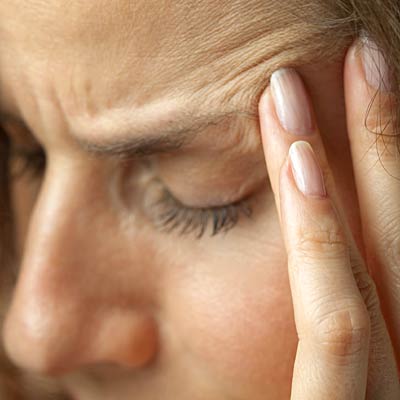Health Care /
Health tips
Is my body normal?
I have one breast that's much bigger than the other. Is that weird?
Nope. Most women have slight differences in the shapes and sizes of their breasts (one nipple points north while the other points south, for example). It’s normal to have one breast larger than the other; sometimes, even by a cup size or two.
As long as this size difference isn’t new, you’re OK. But if one breast has suddenly gotten bigger or feels different (thicker, fuller, or lumpy), you need to be checked out by your doc. A unilateral (one-sided) change could be a sign of a cyst or even a tumor.
As long as this size difference isn’t new, you’re OK. But if one breast has suddenly gotten bigger or feels different (thicker, fuller, or lumpy), you need to be checked out by your doc. A unilateral (one-sided) change could be a sign of a cyst or even a tumor.

I bruise really easily. Should I be worried?
It is something you should discuss with your doctor. Bruises do tend to show up more often as you age, though. Your skin gets thinner and blood vessels become a little more fragile, so it could be that you simply need to be more careful when hustling past sharp corners. You also may bruise more if you’re taking drugs that hamper your blood’s clotting ability, including over-the-counter blood thinners such as ibuprofen or aspirin, or prescription blood thinners such as warfarin (Coumadin). Dietary supplements like fish oil and vitamin E, and foods like garlic and ginger have also been shown to have a blood-thinning effect. Talk to your doctor if you suspect your bruising is the side effect of a blood thinner.
If you experience nosebleeds along with bruising, or if the bruises are large and painful or appeared after you began taking a new medication, see your doctor to rule out a serious illness or drug complication.
If you experience nosebleeds along with bruising, or if the bruises are large and painful or appeared after you began taking a new medication, see your doctor to rule out a serious illness or drug complication.

My handbag weighs a ton. Can that hurt my back?
Yes, it can: Carrying a heavy purse on one shoulder can trigger shoulder and back pain. It can cause posture issues as well—usually because you are compensating for the weight by hunching one shoulder. That causes a postural imbalance, and after years and years, it might be very visible.
It's best to limit the weight of your bag to three pounds, and for heavier loads use backpacks or roller bags. Not the most fashionable, I know, but it's a choice between being fashionable and having back pain.
It's best to limit the weight of your bag to three pounds, and for heavier loads use backpacks or roller bags. Not the most fashionable, I know, but it's a choice between being fashionable and having back pain.

Why do I suddenly have bad body odor?
A quick primer on BO: Bacteria on our skin survive by munching on fat in our sweat; when they digest it, they produce the smell we know and loathe. So why more stink now? If you’re perimenopausal or menopausal, fluctuating hormones may be sending your sweat glands into overdrive. Stress can also boost sweating.
In both cases, your perspiration should lessen in time—and the stink, too. For now, try an antiperspirant with the words “clinical protection” on the label—you’ll get more active ingredients to help fight off sweat-happy bacteria.
In both cases, your perspiration should lessen in time—and the stink, too. For now, try an antiperspirant with the words “clinical protection” on the label—you’ll get more active ingredients to help fight off sweat-happy bacteria.

Is it ok to stick a Q-Tip in your ear?
We know, it feels so good to get in there! But cotton swabs are meant for use on the outside of your ear, not the inside. Sticking one in too far can push wax deeper inside the ear canal, possibly damaging the eardrum. And a little wax is actually healthy—it helps protect your sensitive ear canal.
If your ears are feeling really clogged up, see your doctor, who can suggest ear drops to use at home, or safely remove blockage for you.
To stop your pain and avoid future problems, you need to prevent the need to strain. Try a high-fiber diet plus six to eight glasses of water a day. This combo can soften your stool, making it easier to empty your bowels. The best natural fiber sources are whole grains, vegetables, and fruits, but in a pinch a supplement will do.
For temporary relief from pain or itching, you might try an OTC cream or a sitz bath (an apparatus that allows you to soak your bum in warm water while sitting on the toilet). Ask your doctor about adding salt or baking soda to the water for additional relief.
If your ears are feeling really clogged up, see your doctor, who can suggest ear drops to use at home, or safely remove blockage for you.
To stop your pain and avoid future problems, you need to prevent the need to strain. Try a high-fiber diet plus six to eight glasses of water a day. This combo can soften your stool, making it easier to empty your bowels. The best natural fiber sources are whole grains, vegetables, and fruits, but in a pinch a supplement will do.
For temporary relief from pain or itching, you might try an OTC cream or a sitz bath (an apparatus that allows you to soak your bum in warm water while sitting on the toilet). Ask your doctor about adding salt or baking soda to the water for additional relief.

I got two bad colds last winter that turned into tonsillitis. Is that a reason to have my tonsils out?
Removing the tonsils, those two fleshy bits of soft tissue at the back of your throat, used to be common, but not anymore. These days, your doctor will probably consider taking out your tonsils only if you have very frequent tonsillitis (seven times or more in a year, or multiple times each year for several years), if you have a severe bacterial infection in the area that doesn't improve with antibiotics or if your tonsils are making it hard for you to breathe or swallow.
Most other episodes of tonsillitis—infection and inflammation of the tonsils that lead to a sore throat and difficulty swallowing—are caused by viruses and go away on their own, so there would be no need for you to go under the knife.
Most other episodes of tonsillitis—infection and inflammation of the tonsils that lead to a sore throat and difficulty swallowing—are caused by viruses and go away on their own, so there would be no need for you to go under the knife.

I know a glass of wine every day can be good for heart health. Do you still benefit if you cook with wine rather than drink it?
Not really. Wine may add great low-calorie flavor to your dish, but most of its heart benefits come from the alcohol, almost all of which gets cooked off when it's heated. And while resveratrol, which is present in the skin of the grape, may protect against obesity and diabetes according to animal studies, the substance isn't concentrated enough in a glass of wine to be helpful to your health, regardless of whether you drink it or use it in your tomato sauce.

My period is suddenly irregular—what's up with that?
It's not unusual to miss a period every now and then, or for your period occasionally to be different (lighter, heavier, longer or shorter) than usual. If you're not pregnant, other factors that can throw your hormones (and thus your cycle) out of whack include stress, a large weight loss or gain, travel, a big increase in the amount of exercise you're doing or illness.
Period irregularity is also a very common symptom of perimenopause, the stage leading up to menopause, which starts anytime between your late 30s and early 50s and can last between a few months and 10 years. (When you've missed a full 12 months of periods, that's officially menopause.)
Treatment suggestions may include taking birth control pills, trying hormone therapy or adopting a more regular and healthy diet and workout plan

I get painful leg cramps in the middle of the night. How can I prevent them?
Nighttime leg and foot cramps are common, and they increase as we age; pregnant women are also prone to them. While the cause can be tough to pinpoint, culprits include muscle fatigue (from a hard workout or uncomfortable shoes), dehydration or sitting for too long. These cramps can also result from taking certain medications, like statins, steroids and even birth-control pills. Or they may be an indication that you have low levels of magnesium, calcium or potassium in your blood.
To prevent them, try leg stretches before bed, especially if you think muscle fatigue is the cause of your problem. Make sure you get seven to eight hours of sleep a night, and drink plenty of water—light yellow pee is an indication that you're well-hydrated. Eat a balanced diet, with plenty of calcium (dairy products are a great way to load up), magnesium (from foods like almonds, whole-wheat bread and spinach) and potassium (found in meat and fish, as well as bananas and broccoli). Taking a 300-milligram magnesium supplement might also help (if pregnant, consult your ob-gyn first).
In rare cases, cramps are related to circulation problems or thyroid trouble. So if nothing seems to help and the pain is interfering with your sleep, a doctor's visit is in order.
To prevent them, try leg stretches before bed, especially if you think muscle fatigue is the cause of your problem. Make sure you get seven to eight hours of sleep a night, and drink plenty of water—light yellow pee is an indication that you're well-hydrated. Eat a balanced diet, with plenty of calcium (dairy products are a great way to load up), magnesium (from foods like almonds, whole-wheat bread and spinach) and potassium (found in meat and fish, as well as bananas and broccoli). Taking a 300-milligram magnesium supplement might also help (if pregnant, consult your ob-gyn first).
In rare cases, cramps are related to circulation problems or thyroid trouble. So if nothing seems to help and the pain is interfering with your sleep, a doctor's visit is in order.

Is it normal to get stomach pains after eating a big meal?
It depends on how big the meal was. Gas is produced during the digestion process, which causes the stomach and intestines to expand. Most of the time, you don't notice the expansion, but if you have a very large meal or one with a lot of gas-producing foods—like broccoli or beans—you may have painful bloating. Another possible cause: acid reflux, especially if the meal included tomato sauce, caffeine or citrus fruit. Reflux is commonly associated with heartburn but can also cause abdominal pain and bloating. This is nothing to worry about if it happens occasionally, but if it occurs more than three times a week, talk to your doctor about taking meds to control it, since over time the acid can cause inflammation of your esophagus.
If your postmeal pain is constant and severe, is in your upper abdomen and is accompanied by fever or nausea, see a doctor. It might be a gallstone — a hard pebble in your gallbadder that can get lodged in a duct and cause pain following a feast, and sometimes lead to inflammation and infection. Your doctor may want to watch and wait, since these stones often go away on their own. Or you may need medication or surgery to treat the problem.

Is there any way to tell the difference between a bad headache and one that's life-threatening?
Most headaches aren't dangerous—a migraine may feel awful, but you'll survive it. In very rare cases, though, extreme head pain is a sign of something worrisome and even potentially fatal—like a ruptured aneurysm or hemorrhagic stroke, in which a blood vessel in the brain leaks or bursts. Patients often describe these headaches, which are medical emergencies, as "the worst headache of my life." They typically come on abruptly and forcefully, and they can be accompanied by neurological changes like confusion or blurred vision. Meningitis, an infection of the membranes surrounding the brain and spinal cord, can also cause a severe headache, often along with a stiff neck. If you suspect your pain might be something serious, play it safe and get medical attention as soon as possible.





